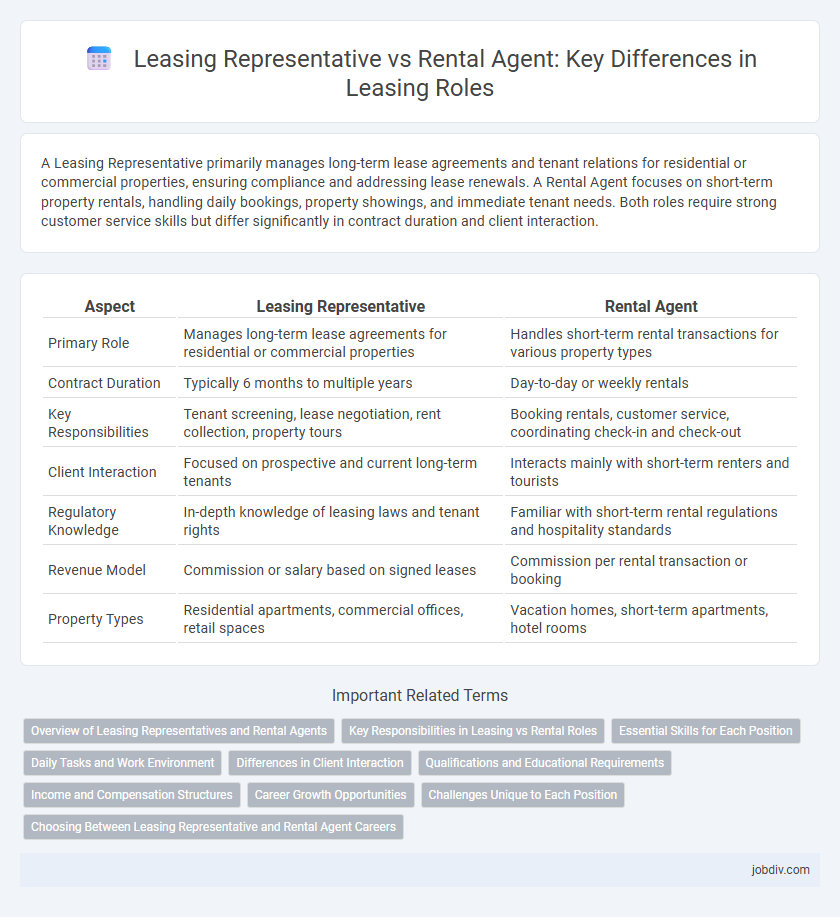A Leasing Representative primarily manages long-term lease agreements and tenant relations for residential or commercial properties, ensuring compliance and addressing lease renewals. A Rental Agent focuses on short-term property rentals, handling daily bookings, property showings, and immediate tenant needs. Both roles require strong customer service skills but differ significantly in contract duration and client interaction.
Table of Comparison
| Aspect | Leasing Representative | Rental Agent |
|---|---|---|
| Primary Role | Manages long-term lease agreements for residential or commercial properties | Handles short-term rental transactions for various property types |
| Contract Duration | Typically 6 months to multiple years | Day-to-day or weekly rentals |
| Key Responsibilities | Tenant screening, lease negotiation, rent collection, property tours | Booking rentals, customer service, coordinating check-in and check-out |
| Client Interaction | Focused on prospective and current long-term tenants | Interacts mainly with short-term renters and tourists |
| Regulatory Knowledge | In-depth knowledge of leasing laws and tenant rights | Familiar with short-term rental regulations and hospitality standards |
| Revenue Model | Commission or salary based on signed leases | Commission per rental transaction or booking |
| Property Types | Residential apartments, commercial offices, retail spaces | Vacation homes, short-term apartments, hotel rooms |
Overview of Leasing Representatives and Rental Agents
Leasing representatives manage lease agreements, conduct property tours, and assist tenants throughout the leasing process to maximize occupancy rates and ensure compliance with property policies. Rental agents primarily handle short-term rental transactions, coordinate tenant move-ins and move-outs, and facilitate communication between landlords and renters. Both roles require strong customer service skills but differ in contract duration focus and administrative responsibilities within the real estate leasing industry.
Key Responsibilities in Leasing vs Rental Roles
Leasing Representatives primarily handle the process of securing long-term tenants by conducting property tours, screening applicants, preparing lease agreements, and facilitating lease renewals. Rental Agents focus on managing short-term rental transactions, coordinating the rental process, processing payments, and ensuring compliance with rental policies. Both roles require strong communication and customer service skills but differ in contract length, tenant management, and operational procedures.
Essential Skills for Each Position
Leasing representatives excel in customer relationship management, financial analysis, and contract negotiation, which are crucial for securing long-term lease agreements and maximizing property value. Rental agents prioritize rapid decision-making, property showing expertise, and effective communication to facilitate short-term rental turnovers and maintain high occupancy rates. Both roles demand strong sales skills and knowledge of leasing laws, but their focus diverges based on lease duration and client interaction complexity.
Daily Tasks and Work Environment
Leasing Representatives primarily focus on leasing residential or commercial properties by conducting property tours, processing lease applications, and coordinating tenant move-ins within office-based environments. Rental Agents handle daily rental transactions, including verifying guest information, managing short-term rental agreements, and addressing customer inquiries, often working at rental locations such as car rental counters or equipment rental offices. Both roles require strong communication skills but differ in work environment dynamics and client interaction frequency.
Differences in Client Interaction
Leasing representatives primarily engage with clients during the lease agreement process, offering detailed property information, conducting tours, and guiding tenants through application requirements. Rental agents typically manage shorter-term interactions, focusing on processing reservations and addressing immediate rental needs for vacation or temporary stays. The key difference lies in the leasing representative's role in establishing long-term tenant relationships versus the rental agent's emphasis on quick, transactional client interactions.
Qualifications and Educational Requirements
Leasing representatives typically require a high school diploma or equivalent, with some employers preferring candidates who have postsecondary education in business or real estate. Rental agents often need similar qualifications but may also require specialized certifications or licenses, such as a real estate salesperson license, depending on state regulations. Both roles benefit from strong customer service skills, knowledge of leasing laws, and experience in property management or sales.
Income and Compensation Structures
Leasing representatives typically earn a base salary combined with commission based on lease agreements signed, ensuring a steady income plus performance incentives. Rental agents often receive hourly wages or commissions tied to short-term rentals, resulting in more variable earnings depending on rental volume. Compensation structures for leasing representatives tend to emphasize long-term client retention, while rental agents focus more on transaction frequency.
Career Growth Opportunities
Leasing representatives typically have broader career growth opportunities compared to rental agents, as they handle long-term lease agreements and work closely with property management teams. Rental agents mainly focus on short-term rentals or daily transactions, limiting their exposure to complex leasing processes and strategic decision-making. Advancing as a leasing representative can lead to roles such as leasing manager or property manager, offering higher responsibility and increased salary potential.
Challenges Unique to Each Position
Leasing Representatives face challenges such as managing long-term lease agreements, ensuring compliance with legal regulations, and addressing tenant retention strategies specific to multifamily or commercial properties. Rental Agents encounter unique obstacles including handling short-term rentals, coordinating quick turnovers, and managing customer expectations for flexible lease terms. Both roles demand strong communication skills but differ significantly in scope, with Leasing Representatives focusing on long-term client relationships and Rental Agents emphasizing rapid customer service and unit availability.
Choosing Between Leasing Representative and Rental Agent Careers
Choosing between a Leasing Representative and a Rental Agent career depends on career goals and work environment preferences. Leasing Representatives often handle long-term leases, understand property management software, and focus on tenant relations for residential or commercial properties. Rental Agents typically manage short-term rentals, handle quick client turnover, and require strong skills in customer service and contract negotiation for vacation or temporary housing markets.
Leasing Representative vs Rental Agent Infographic

 jobdiv.com
jobdiv.com